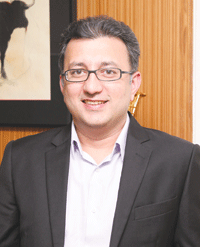Dilip Thakore interviewed Dr. Ranjan Pai, managing director and chief executive of Manipal Education and Medical Group Pvt. Ltd (MEMG), the holding company of all for-profit enterprises of the Manipal Education Group, in his office in Manipal Towers, Bangalore. Excerpts from the 90 minute interview.
 For over 50 years the focus of the Manipal Education & Medical Group (MEMG) has primarily been on professional — medical, engineering, business management education. What is the stimulus behind the entry into K-12 school education?
For over 50 years the focus of the Manipal Education & Medical Group (MEMG) has primarily been on professional — medical, engineering, business management education. What is the stimulus behind the entry into K-12 school education?
Although it’s not well-known, my grandfather, the late T.M.A. Pai who constructed and promoted our flagship Kasturba Medical College in Manipal in 1953, began his involvement with Indian education by promoting several village schools in the Udupi district of Karnataka. Therefore we are not strangers to school education. But with a reputation to maintain, we waited for the right moment and right partners, rather than venture half-heartedly into this important sector. The right moment and partners presented themselves about two years ago, when we purchased an equity stake in the Bangalore-based company TutorVista Global, a pioneer in providing private tuitions worldwide over the internet. Together we have promoted Manipal K-12 Education Pvt. Ltd which will manage, operate and build high quality schools across the country.
What are the perceived lacunae in school education which Manipal K-12 will address?
In the K-12 domain in India, there are some schools which provide excellent primary and secondary education. But quality control and standardisation is rare. Even in the country’s largest school chains, teaching standards and learning outcomes vary from school to school. In Manipal K-12 Education we have appointed a very high quality management team, which is working on providing standardised teacher training, technology-driven English medium curriculums, and guaranteed learning outcomes. All this at prices affordable to the middle class, which aspires to high quality English medium education.
Popular opinion within the intelligentsia is that the Manipal Education Group is a prime mover in the “commercialisation of education”. What’s your comment?
Such opinions are based on ignorance of ground realities. The plain truth is that the tuition fees charged by Manipal University and colleges of professional — medical, engineering etc — education are amongst the lowest in the world given the quality, and lower than the fees levied by government colleges if subsidisation is excluded. Yet even while charging rock-bottom tuition fees we provide world class academic infrastructure and education. The antidote for commercialisation of higher education is liberalisation and deregulation, which will create additional capacity in professional education and address the supply side of the demand-supply imbalance in higher education.
Learning outcomes and particularly research capability in Indian education, suffer in comparison with global benchmarks. How optimistic are you about India’s chances of reaping its demographic dividend?
Improvement of learning outcomes in education and intensified research require investment in technology and infrastructure in schools and higher education. In higher education in particular, there is an urgent need for greater investment by government and corporates to stimulate research. In Manipal University we accord great weightage to R&D activity, faculty exchange programmes, seminars and workshops and publishing papers in reputed journals. This year Manipal University has budgeted Rs.12 crore for R&D and related activities. But by international standards this is grossly inadequate.
In the final analysis, government has to make provision for funding research in universities and insist upon outcomes. I believe all this is beginning to happen and therefore I am optimistic about the future of Indian education. If greater attention is paid to elementary and vocational education and liberalisation and deregulation of higher education, I’m confident that within the next 10-15 years, India can become the services provider of the world. It’s a question of getting our priorities and policies right.